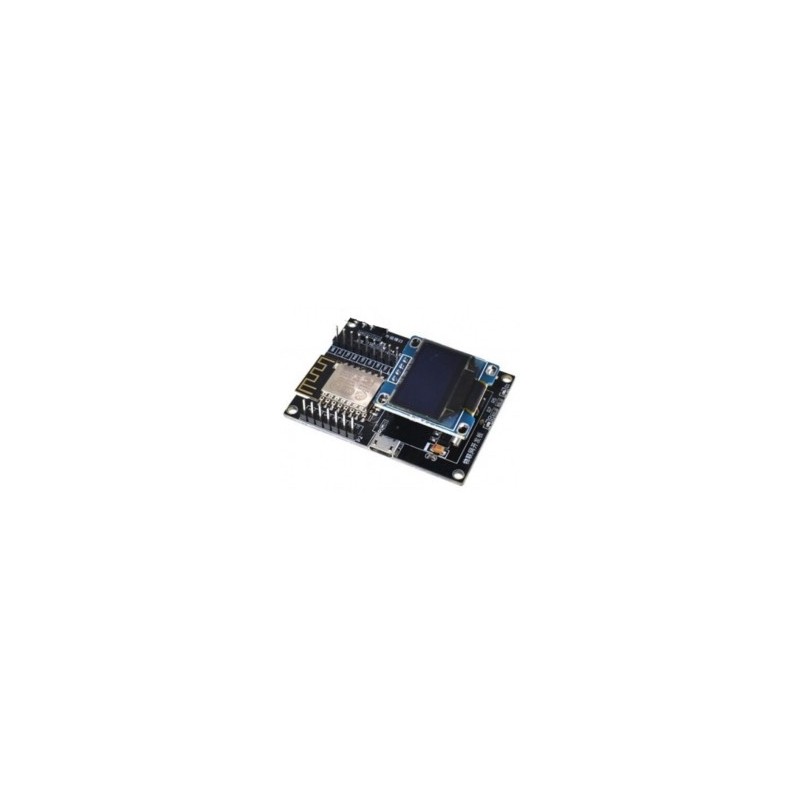- -zł24.97

Development kit with WiFi / Bluetooth module ESP8266 and 0.96 "OLED display .Set equipped with a microUSB connector and ESP8266 module connector.It allows you to create small devices with user interface in the form of a display.It can be the basis for IoT projects or small devices portable.
ESP8266 module
OLED display
Manufacturer BTC Korporacja sp. z o. o. Lwowska 5 05-120 Legionowo Poland sprzedaz@kamami.pl 22 767 36 20
Responsible person BTC Korporacja sp. z o. o. Lwowska 5 05-120 Legionowo Poland sprzedaz@kamami.pl 22 767 36 20
OLD 0.96 "display, 128x64 pixel resolution, I2C, SSD1306, RoHS
No product available!
WiFi 802.11 b/g/n module with ESP8266 system, they have 22 edge terminals with 2 mm raster with the possibility of soldered gold connectors, 9 GPIO lines and 1 ADC line on the connector. Built-in PCB antenna. ESP-12E
Development board D1 Mini with WiFi module ESP-8266MOD and 4 MB Flash memory. The module can be programmed from the Arduino IDE level. WeMos D1 Mini
BMP180 temperature / pressure sensor module compatible with WeMos D1 mini board.
Development board D1 Mini V3 with WiFi module ESP-8266 and 4 MB Flash memory. The module can be programmed from the Arduino IDE level. WeMos D1 Mini V3.x
WiFi module developed by AI-Thinker Co., Ltd with ESP8266 processor. Integrates a 32-bit MCU microcontroller with 80 MHz clock, RTOS support, Wi-Fi and antenna. The module supports the IEEE802.11 b / g / ni standard and has a complete TCP / IP protocol stack. AI-Thinker ESP-12S
Development kit with WiFi / Bluetooth module ESP8266 and 0.96 "OLED display.
Development board D1 Mini Pro with WiFi ESP8266 module and 16 MB Flash memory, equipped with ceramic antenna and external antenna connector. The module can be programmed from the Arduino IDE level. WeMos D1 Mini Pro
WiFi 802.11 b/g/n module with ESP8266 chip, there are 8 pins with UART and GPIO interface. Built-in PCB antenna. SparkFun WRL-17146
Development board with the ESP-WROOM-02 WiFi module. The board has a USB-UART converter, a basket for a Li-Ion 18650 battery and a charging circuit
A set with environmental sensors that allows you to measure air pollution and noise and visualize data on a dedicated platform. Seeed Studio 102110258
No product available!
WiFi module with ESP8266 designed to work with the Raspberry Pi Pico. It communicates via the UART interface using AT commands. Waveshare Pico-ESP8266
Adapter for ESP8266 modules dedicated to control addressable RGB LEDs from the WS2812 series
No product available!
WiFi module with ESP8266 and 1.14" display, designed to work with Raspberry Pi Pico. It communicates via UART interface using AT commands. SB Components 21888
Development board with RP2040 and ESP-12E microcontroller. Equipped with 0.91" OLED display. SB Components 24186
Module with round 1.28" IPS LCD display and 240x240 px resolution and ESP-12E chip. SB Components 24025
The module is based on the ESP8266MOD chip. Thanks to the support of the 802.11 b/g/n standard, it enables wireless communication with WiFi networks, which allows for Internet access and data exchange. WeMos D1 Mini Type-C
The module is based on the ESP8266EX chip. Thanks to the support of the 802.11 b/g/n standard, it enables wireless communication with WiFi networks, which allows for Internet access and data exchange. It is programmed via the USB Type-C connector using Arduino, MicroPython or NodeMCU. WeMos D1 Mini Type-C

Development kit with WiFi / Bluetooth module ESP8266 and 0.96 "OLED display.
